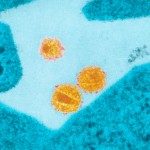Lien vers Pubmed [PMID] – 20195518
PLoS Pathog. 2010 Feb;6(2):e1000780
HIV controllers are rare individuals who spontaneously control HIV replication in the absence of antiretroviral treatment. Emerging evidence indicates that HIV control is mediated through very active cellular immune responses, though how such responses can persist over time without immune exhaustion is not yet understood. To investigate the nature of memory CD4+ T cells responsible for long-term anti-HIV responses, we characterized the growth kinetics, Vbeta repertoire, and avidity for antigen of patient-derived primary CD4+ T cell lines. Specific cell lines were obtained at a high rate for both HIV controllers (16/17) and efficiently treated patients (19/20) in response to the immunodominant Gag293 peptide. However, lines from controllers showed faster growth kinetics than those of treated patients. After normalizing for growth rates, IFN-gamma responses directed against the immunodominant Gag293 peptide showed higher functional avidity in HIV controllers, indicating differentiation into highly efficient effector cells. In contrast, responses to Gag161, Gag263, or CMV peptides did not differ between groups. Gag293-specific CD4+ T cells were characterized by a diverse Vbeta repertoire, suggesting that multiple clones contributed to the high avidity CD4+ T cell population in controllers. The high functional avidity of the Gag293-specific response could be explained by a high avidity interaction between the TCR and the peptide-MHC complex, as demonstrated by MHC class II tetramer binding. Thus, HIV controllers harbor a pool of memory CD4+ T cells with the intrinsic ability to recognize minimal amounts of Gag antigen, which may explain how they maintain an active antiviral response in the face of very low viremia.


